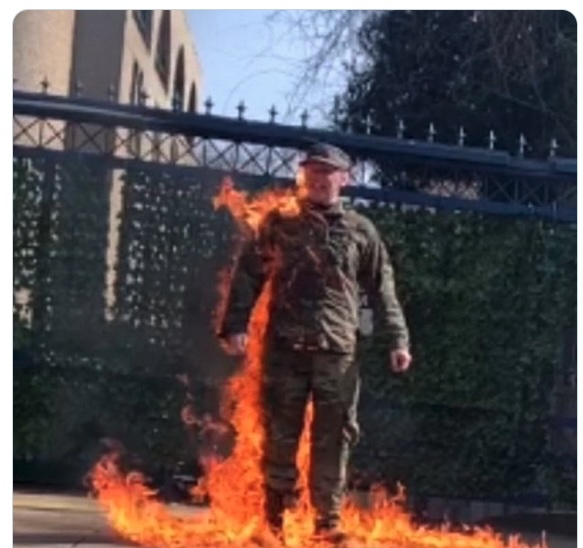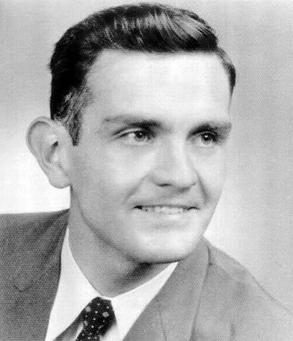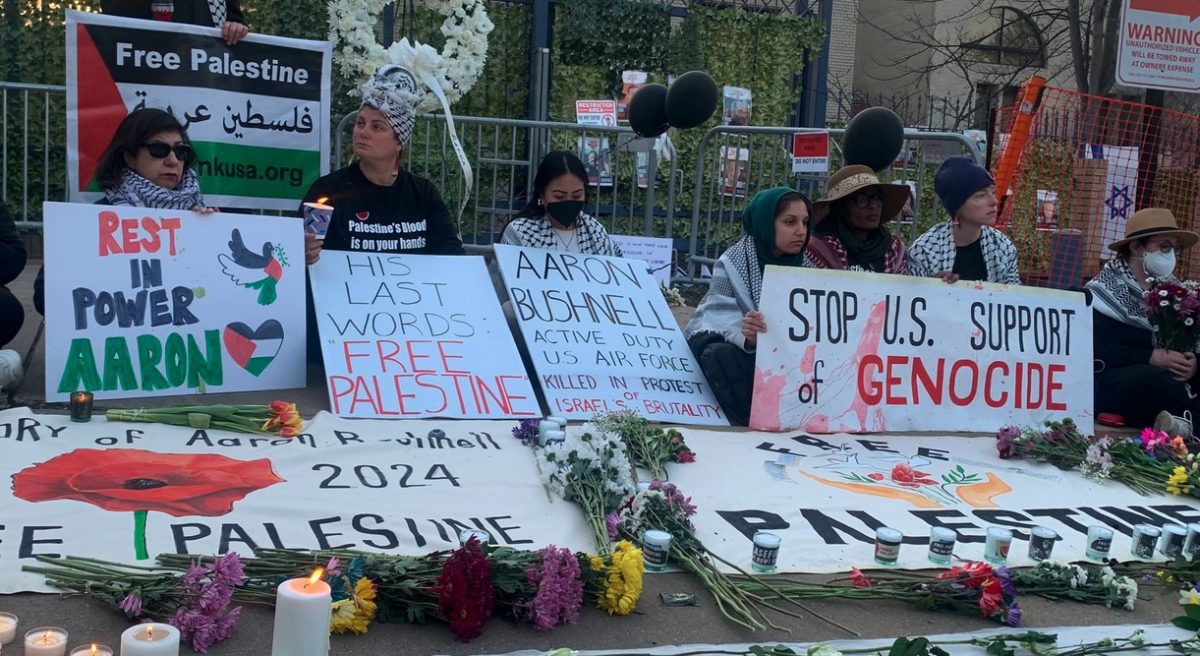On Sunday (Feb.25), Aaron Bushnell, a serving member of the US Air Force, undertook a stunningly focused and courageous act of self-immolation at the gates of the Israeli Embassy here in Washington DC, protesting Israel’s attacks against Gaza and calling for a ceasefire.
Bushnell had set up a camera and livestreamed himself on “Twitch” as he delivered a statement expressing his strong opposition to Israel’s genocide in Gaza and declaring that he no longer wanted to be complicit in it. He then doused himself with kerosene and set fire to his body, while continuing to shout for a “Free Palestine”.

I did not watch the whole video. Those who did describe Bushnell’s demeanor as composed, serious, and very focused. Accounts in the corporate media have tried to imply that he was deranged… or a member of a Christian “cult”… or even (gasp!) an anarchist. News that has come out from his friends and colleagues indicates, by contrast, that he was a good participant in a mutual-aid project in Ohio that offered food for unhoused and indigent people there, and also that he was due to leave the Air Force in May after serving for four years.
There were some reports that he had worked in intelligence in the Air Force, in which case he may have known more than most of us about the volume of the intel and targeting help that the U.S. Air Force has been giving to Israel as part of Biden’s support for Israel’s genocide in Gaza.
Yesterday, there was a reportedly very moving vigil outside the Israeli Embassy, in which dozens of participants solemnly honored Bushnell’s life and his courage. (I was unable to go.)
Aaron Bushnell’s self-immolation brought to mind a number of other similar protests over recent decades. A woman self-immolated in Texas to protest the genocide in Gaza, a few weeks ago; but Bushnell’s action had much greater resonance than hers. Earlier self-immolations have included the one by Mohammed Buazizi in Tunisia that sparked the Arab Spring uprisings in late 2010; a number undertaken a little earlier in Greece, in response to the austerity measures the IMF imposed in 2009; and the series undertaken in both Vietnam and (to a lesser extent) in the United States, in protest against the brutality of Washington’s war on Vietnam.

In the latter context, I have thought a lot in recent weeks about the self-immolation that Norman Morrison carried out on the steps of the Pentagon in November 1965. Like me, Norman was a member of a Quaker meeting here in the Chesapeake Bay region, and he was very active in anti-war organizing at that time. On that Saturday morning, November 2, 1965, he set out from his home in Baltimore with his 15-month-old daughter Emily, and her diaper-bag, and drove to the main steps of the Pentagon where he handed Emily (and her diaper-bag) off to a bystander then calmly poured kerosene over himself and st himself alight.
Norman’s self-burning came after a string of self-burnings that Buddhist monks in Vietnam had carried out to protest the war that Pres. Lyndon Johnson had been escalating. It was also preceded by other self-immolations here in the United States, including one by German-American anti-fascist Alice Herz. But Norman was the first to self-immolate on the steps of the Pentagon; and his action garnered a lot of attention– within the United States, and also to a much greater extent all across Vietnam.
What difference does such an action make? On the PalCast podcast, my co-hosts are Yousef Aljamal and Tony Groves– two people very familiar with the hunger-strikes-to-the-death that independence activists in Ireland and Palestine have carried out over the decades. In the PalCast episod we recorded this morning, they both immediately put Aaron Bushnell’s self-immolation into that same category of “using your own body as weapon tool in the liberation struggle when nothing else seems available.”
We have yet to see the extent of the resonance that Bushnell’s super-brave act will have. The Houthi politburo member Muhammad Al-Bukheiti commented:
Today, the world lost Aaron Bushnell, a brave, noble, and conscientious human being, but his message reached and resonated around the world. Aaron proved that his conscience’s ability to bear the scenes of dead and wounded Palestinian children was weaker than his ability to bear the pain of fire burning his body, so he continued to chant freedom for Palestine until the last moment of his life. Thank you Aaron, your message has awakened the global conscience, but we will continue to cry for you as we cry for the children of Palestine.
Hamas’s leadership issued a statement that said, in part:
We in the Islamic Resistance Movement (Hamas) express our deepest condolences and our full solidarity with the family and friends of the American pilot Aaron Bushnell, whose name has been immortalized as a defender of human values and the oppression of the Palestinian people who are suffering because of the American administration and its unjust policies, as well as the American activist Rachel Corrie, who was crushed by a Zionist bulldozer in Rafah in 2003. It is the same city that Bushnell paid with his life for putting pressure on his country’s government to prevent the criminal Zionist army from attacking it and committing massacres and violations there.
As for Norman Morrison, his own family members and many of their fellow-Quakers were mystified or torn over his decision to self-immolate, or openly critical of it. In Vietnam, though, he was widely lauded as a selfless hero. meanwhile, here in Washington DC there is some evidence that hby burning himself on the steps of the Pentagon Norman was able to reach something in the heart of Defense Secretary Robert McNamara. The powerful documentary The Fog of War that film-maker Errol Morris released in 2003 consists of a series of piercing, almost interrogation-style, interviews that Morris made with MacNamara toward the end of his life, inter-cut with newsreel clips providing details of the devastation that McNamara’s war(s) wrought. Toward the end of the movie, as I recall, McNamara remembers how he was sitting in his office in the Pentagopn on that Saturday morning, and he looked out and saw Norman Morrison’s self-immolation. He said (again, as far as I imperfectly recall) that he had gone home and discussed what he had seen with his spouse, and that it had caused him to think hard.
However, as Bill the Spouse pointed out when we discussed this a few weeks ago, McNamara did not immediately stop the United States’ ghastly assault on Vietnam, which continued for many more years.
Anyway, today I salute Aaron Bushnell very deeply. I strongly doubt whether he was able to touch the nheart of any of the officials in the Israeli Embassy here. But I think that with his action he touched the hearts of millions of people here in the United States and around the world.
And here, by the way, is a little collection of resources I had collected when I first started thinking hard about Norman Morrison and his action, back in November. Happy to share them with you all here.


